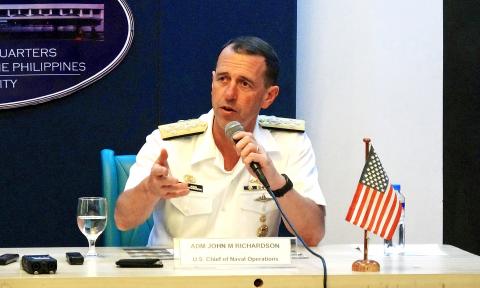The US military will continue to advocate free navigation through international waters, including the Taiwan Strait, a top US Navy official said on Monday.
“Parts of the Taiwan Strait are international waters. They are accessible to all who want to pass through them,” US Chief of Naval Operations Admiral John Richardson said at a press conference at Camp Aguinaldo, Quezon City, Philippines.
“They’re part of the global commons, which is the foundation for free navigation, and so in this area, the United States and the United States Navy will continue to advocate for free navigation through those international waters, where we will operate and sail and fly or enter wherever international law allows,” Richardson said.

Photo: CNA
The US official’s comments were made in response to a question from Central News Agency on how he sees the current situation in the Taiwan Strait, and what the US military would do to help maintain peace and stability there.
He was non-committal on what operations the US might have planned in the region for the future.
“I think it’s not healthy to speculate on those sorts of things, but you can count on us to be persistent and consistent advocates for freedom of navigation through international waters,” Richardson said.
His pledge came after two US ships, shadowed by Chinese People’s Liberation Army (PLA) warships, sailed through the Taiwan Strait on Monday last week and a Chinese destroyer came dangerously close to a US Navy ship in the disputed South China Sea last month.
The ships’ passage were criticized by China, although its response was relatively muted.
Richardson said the US Navy would continue to communicate with the PLA on the Code for Unplanned Encounters at Sea.
Noting that the Philippines and other ASEAN claimant states are negotiating a code of conduct to govern actions in the disputed area, Richardson said any progress is a move in the right direction, whether the code is legally binding or not.
In related news, President Tsai Ing-wen (蔡英文) yesterday received a delegation from Chinese-American community organization Hop Sing Tong in Taipei.
A stable Taiwan-US relationship is an important foundation for defending democracy, and maintaining peace and stability in the Indo-Pacific region, Tsai told the delegation.
Tsai thanked the overseas Taiwanese community for their warm welcome when she transited through the US on her trip to Paraguay and Belize in August, for being the government’s “backbone” overseas and for consistently supporting the nation through action.
Over the past two years, exchanges between Taiwan and the US have become more frequent and bilateral relations have continued to grow, she said.
CPC Corp, Taiwan (CPC, 台灣中油) is to purchase US$25 billion worth of liquefied natural gas from the US, and Formosa Petrochemical Corp (台塑石化) and Hon Hai Group (鴻海集團) have made investments in Louisiana and Wisconsin respectively, she said.
These partnerships help boost Taiwan-US relations, she said.
Taiwan is not only strengthening its cooperation with countries with similar ideologies, but also striving to transform and upgrade domestic industries, and to attract foreign investment, Tsai said.
Additional reporting by Sherry Hsiao

US PUBLICATION: The results indicated a change in attitude after a 2023 survey showed 55 percent supported full-scale war to achieve unification, the report said More than half of Chinese were against the use of force to unify with Taiwan under any circumstances, a survey conducted by the Atlanta, Georgia-based Carter Center and Emory University found. The survey results, which were released on Wednesday in a report titled “Sovereignty, Security, & US-China Relations: Chinese Public Opinion,” showed that 55.1 percent of respondents agreed or somewhat agreed that “the Taiwan problem should not be resolved using force under any circumstances,” while 24.5 percent “strongly” or “somewhat” disagreed with the statement. The results indicated a change in attitude after a survey published in “Assessing Public Support for (Non)Peaceful Unification

The CIA has a message for Chinese government officials worried about their place in Chinese President Xi Jinping’s (習近平) government: Come work with us. The agency released two Mandarin-language videos on social media on Thursday inviting disgruntled officials to contact the CIA. The recruitment videos posted on YouTube and X racked up more than 5 million views combined in their first day. The outreach comes as CIA Director John Ratcliffe has vowed to boost the agency’s use of intelligence from human sources and its focus on China, which has recently targeted US officials with its own espionage operations. The videos are “aimed at

‘MISGUIDED EDICT’: Two US representatives warned that Somalia’s passport move could result in severe retaliatory consequences and urged it to reverse its decision Minister of Foreign Affairs Lin Chia-lung (林佳龍) has ordered that a special project be launched to counter China’s “legal warfare” distorting UN Resolution 2758, a foreign affairs official said yesterday. Somalia’s Civil Aviation Authority on Wednesday cited UN Resolution 2758 and Mogadishu’s compliance with the “one China” principle as it banned people from entering or transiting in the African nation using Taiwanese passports or other Taiwanese travel documents. The International Air Transport Association’s system shows that Taiwanese passport holders cannot enter Somalia or transit there. The Ministry of Foreign Affairs (MOFA) protested the move and warned Taiwanese against traveling to Somalia or Somaliland

SECURITY: Grassroots civil servants would only need to disclose their travel, while those who have access to classified information would be subject to stricter regulations The government is considering requiring legislators and elected officials to obtain prior approval before traveling to China to prevent Chinese infiltration, an official familiar with national security said yesterday. President William Lai (賴清德) in March announced 17 measures to counter China’s growing infiltration efforts, including requiring all civil servants to make trips to China more transparent so they can be held publicly accountable. The official said that the government is considering amending the Act Governing Relations Between the People of the Taiwan Area and Mainland Area (臺灣地區與大陸地區人民關係條例) to require all civil servants to follow strict regulations before traveling to China.